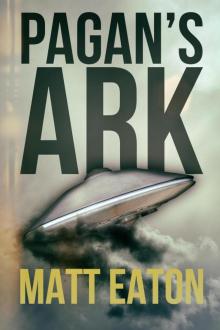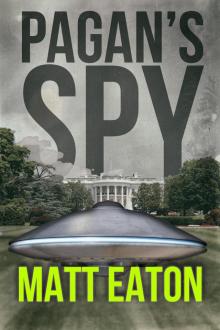- Home
- Matt Eaton
Apollo 8.1 Page 2
Apollo 8.1 Read online
Page 2
“Thanks for coming,” he tells them, “I think that went well.”
“Glad to do it,” says Borman.
Lovell says, “Always a privilege to visit the White House.”
“Again,” Anders adds, grinning.
Ziegler shakes their hands and points to a pair of burly Secret Service agents. “I’m told these boys will show you out. Thanks again.”
The agents begin politely, but firmly, herding them toward a side entrance, until a man they all recognize blocks their path. The smile on Dr Donald Menzel’s face appears genuine enough. “Good to see you gentlemen again.”
“Spotted any bogeys lately, doc?” Lovell asks.
“Nothing to write to Santa Claus about, Captain.”
Lovell grins. “That’s good, I like that.”
Such is Menzel’s oblique way of referring to the unidentified craft the Apollo 8 crew spotted on the far side of the Moon — something very few people know about. When they finally left lunar orbit to head for home, Borman had told Houston, “Please be informed there is a Santa Claus.”
Menzel grins back dismissively, then quickly turns to Borman. “Frank, do you have a minute?” The question is posed more like an order than a request.
Lovell raises an eyebrow. “Now I’m really interested.”
Borman says, “We were just on our way out.”
One of the Secret Service agents says, “It’s fine, Colonel. I think you two need to talk.”
Menzel says, “There, see? Afterwards, I can take you wherever you need to go.”
Borman can see the scientist isn’t going to take no for an answer. He turns to Anders and Lovell and tells them, “Go on ahead guys, I’ll catch up.”
They silently wave their goodbyes. The Secret Service agents split up, one escorting Lovell and Anders, the other remaining behind. Since being anointed the point man on all things unexplainable, Menzel has enjoyed the full cooperation of the Secret Service, an arrangement set in place by President Harry Truman and honored to this day. Though since Eisenhower left, every succeeding president has been kept in the dark about it.
Menzel waits for the other astronauts to disappear, before ushering Borman into a small windowless office to their right. The Secret Service man takes position outside the door.
The room is tastefully furnished with a drinks cabinet and a smallish conference table for meetings of up to eight people. Menzel closes the door behind them. There is a jug of water and two glasses in the middle of the table. Menzel sits down facing the door, placing a thin leather attaché case on the table in front of him. He holds out his arm, urging Borman to take a seat opposite.
“How have you been, Frank?”
Borman sits and pours himself a glass of water. “Busy.”
“So I’ve noticed. No rest for Time magazine’s Men of the Year, eh?”
A less confident man might be troubled by the undertone of mockery in Menzel’s remark. Borman ignores it. “We’ll be yesterday’s news soon enough. Once we get Neil and Buzz down in the Sea of Tranquility, nobody’s gonna be talking about Apollo 8.”
“No regrets about hanging up your space helmet?”
Borman smiles and slowly shakes his head. “I’ve done what I set out to do. We beat the Russians to the Moon.”
Menzel raises an eyebrow in surprise. “Was that truly your main motivation?”
“If it wasn’t for our burning desire to beat the commies, we wouldn’t be going at all. I just helped get it done by President Kennedy’s deadline.”
“Five years in the ground and Kennedy is still a man of his word,” says Menzel. “Of course, the fact that we threw twenty billion dollars at the problem helped things along, wouldn’t you say?” Almost as an afterthought, he adds, “Along with the bravery and ingenuity of everyone involved.”
“I’m guessing you didn’t call me in here to blow wind up my butt. Wouldn’t have anything to do with Mr Nixon’s job offer by any chance?”
The astrophysicist pulls a manila folder out of his attaché case. “You don’t want to be NASA administrator. Nixon is going to gut the place. Do you want to be remembered as the man who killed the space program?”
“You don’t mince words, do you Donald?”
“Look, I don’t for a moment think you are yesterday’s man, Frank. On the contrary, I think you are still very much a man of your time.” He opens the manila folder just far enough to check on what’s inside.
Borman is staring at the folder. “You here to talk to the president?”
“Good God, no,” says Menzel. “He doesn’t have the clearance to talk to me. I’m here to see you, Frank.”
When last they’d met, Menzel had revealed himself as the head of a shadowy group known as the Verus Foundation; keepers of the world’s greatest secrets, gathered together in one place for that moment in the future when they might be revealed. A group one step removed from official intelligence channels — outside of government, politics, and big business — solely dedicated to the preservation of one thing: the truth. Thus far, Menzel has given Borman no indication of when, if ever, Verus plans to reveal all.
For now, that dedication appears to be focused only upon keeping the truth hidden from public view. This is largely due to the power wielded by those within official military-industrial intelligence circles. These few are likewise privy to the secrets, but unwavering in their determination that they remain so permanently. Which, of course, is the very reason Verus is so important. Truman had reasoned that with secrets being compartmentalized into smaller and smaller parcels, each guarded jealously by a select few who never talk to one another, critical information could one day be lost forever. Or that it could never be fully understood in the proper context.
Verus is both memory and the context, jealously guarded by Menzel and his associates. While regarded with increasing degrees of antagonism by the military-industrial intelligence establishment, they remain autonomous and untouchable. They have the goods, as it were, on anybody who might wish them harm.
Before they blasted off to the Moon, Borman, Lovell, and Anders had been briefed on the possibility of seeing something strange on the far side. Colonel Wade Fallon, a crusty, laconic, and lethal plain-clothed defense intelligence man, had handed Borman a Minox spy camera and ordered him to photograph whatever they saw. They were the same rank, but Fallon had the drop on him by his clearance level. He clearly knew a lot more than he revealed to the astronauts.
Fallon also told them to keep their mouths shut, and especially to tell nobody at NASA, an organization renowned for its inability to keep anything secret. He warned that breaking silence on this would be career suicide. Emphasis placed knowingly on the suicide, suggesting career change might in fact be the least of their problems if they blabbed.
Borman had taken a photograph, as ordered. But upon his return to Earth, Borman had informed Fallon the camera was lost after splashdown, falling from his spacesuit as he exited the space capsule. Whether or not Fallon believed him hardly matters now. Given the circumstances, Fallon had no real motivation to act against them, just as long as they kept quiet about what they saw. He was one of those wheels-within-wheels guys, precisely the sort of unaccountable backroom type Borman had long despised. While not normally a good liar, Borman had been highly motivated when he met Fallon after the landing that day — because he’d already handed the spy camera over to Menzel. In so doing, a deal of sorts was struck with the scientist.
“There’s something I need you to do for me,” says Menzel.
Right about now, it’s starting to feel to Borman like he’s just bypassed one devil only to strike a bargain with another. He says, “Don’t know if you heard — Mr Nixon is sending me on a trip to Europe.”
“Oh, don’t worry, you can take your little junket. I know you’d hate to disobey an order from the ‘commander in chief’.”
Menzel says the words like he doesn’t believe the title is genuine. Like he couldn’t actually give a damn about the president’s orders. He’s staring at Borman now, waiting to see who’ll blink first. Finally, Borman says, “So you gonna tell me or not?”
“I’ve kept your secret as long as I dared. Powerful men are about to come looking for you,” says Menzel.
“You mean you sold me out.”
Menzel shakes his head. “The problem’s always been that they knew you’d see something out there. Which means you have two choices here: let me take you to them, or face them on your own.”
“There’s always door number three — that’s me ignoring the lot of you.”
“You don’t ignore these guys, Frank. Not if you know what’s good for you. Besides, I think you’ll want to hear what they have to say.”
3
March 1
From the bottom of the air stairs on his Eastern Airlines whisper jet, a Kombi courtesy vehicle takes Borman along the service roads skirting the runways of LAX. For a moment, as the jet lag takes hold, he is forced to remind himself he’s no longer in Europe, but back on home soil. Familiar territory, yet strange nonetheless. In 48 hours, he needs to be down at Cape Canaveral for the Apollo 9 launch, part of the official vice-presidential party.
Today promises to be something else entirely.
He’s at the Los Angeles Airways helicopter base within a few minutes. The chopper pilot is standing by for his arrival. Moments later, he’s airborne again. A fifteen-minute flight avoiding two hours of traffic and a whole lot of official scrutiny.
Borman is the only passenger. This is Menzel’s idea of security. Heck, if the man wants to spend lavish amounts of money to keep things compartmentalized, Borman isn’t about to argue the point. He gets the feeling that in the secret circles through which Donald Menzel passes, money is no object.
Hopefully they won’t just take this poor chopper pilot out the back and shoot him in the head when they’re done.
4
It must be nearly ten years since Borman last saw Bill ‘Trick’ Stamford. He’s the last person Borman expected to find waiting for him on the ground at Edwards, and about bottom of the list of people from those days he’d have hoped to see again.
He’d secretly been hoping they’d bring in Chuck Yeager for this one, even though he’s been rotated out to command the 405th Fighter Wing in the Philippines. Yeager would have been here with bells on, given half a chance. He probably doesn’t even know.
Borman has never liked Trick Stamford. The nickname said it all. He was a lousy test pilot, the sort who nearly gets other men killed by reckless endangerment, but always stays alive himself. Frank almost hates himself as he holds out his hand for Stamford to shake — who’s he trying to impress?
Stamford shakes it warmly, like they’re the best of friends. “Great to see you, Frank. I’ve got to say, wow man. I’m in awe of what you did. I mean it. Flying to the Moon... What was that like?”
“Greatest adventure of all time. And the toughest thing I’ve ever done. Left test pilot school for dead. We had some terrifying moments up there. Fair to say NASA gave me the greatest frights of my life.”
Stamford grins. “Yeah. That’s what I figured.”
“Other than the day I married the woman of my dreams.”
He and Stamford served together at Edwards under Yeager, but it’s about all they have in common. They’ve always been polar opposites. Borman set himself to rigid standards of self-discipline, devoting himself to God and country, and eventually to Susan. Stamford had only ever been out for a good time. He had a high level of natural ability as a pilot, but it was as if he didn’t really want to be in the Air Force. If not for that factor alone, he might have been good enough to be an astronaut. Instead, backed by his father’s money and influence, he treated his time in the Air Force like it was the ultimate joy ride. As it was, after a few close calls and a test plane that ended up a fiery wreck, the Air Force got him out of everybody’s way pretty damn quick. Borman had always assumed Trick simply went to work for daddy.
But he’s here all on his own today. And something about the man’s demeanor is different. There’s a calmness, a quiet sense of belief that was sadly lacking when last their paths had crossed. The old swagger is gone. In its place, an unspoken confidence of the sort that doesn’t seek approval and is thus untroubled by the opinions of others. Menzel has it too. Money alone doesn’t buy that degree of certainty. It comes from power.
Trick’s father, Garrick Stamford, the multi-millionaire aerospace investor, pulled all the strings to get his son into the test pilot program. He’s the sort of man who doesn’t accept no for an answer. His son, on the other hand, had devoted his energies almost entirely to hedonism during his time in the Air Force. A womanizer, a profligate wastrel, a borderline alcoholic — catastrophically self-destructive for mere mortals, yet somehow seen as tolerable, even endearing characteristics of the uber rich. In that way, too, Trick would have made the perfect astronaut.
Feeling his low opinion of the man tempered by what appears to be genuine admiration on Stamford’s part, Borman deigns to shoot the breeze a while about the past, an air of forgiveness that comes with the passing of years. They avoid the topic at hand, until the point where there is nothing but the obvious to talk about.
“What’s your role here, Trick?” Borman asks. Stamford just taps his nose and says nothing. “What about the test pilot school — they know anything about this?”
Stamford gazes across the tarmac toward the buildings a mile or so distant. “No. Those guys don’t have the clearance.”
A momentary silence descends; Borman resists the urge to fill the gap. But Trick is on a roll, excited to have a famous astronaut all to himself. He points a finger at the furious activity going on around them. “How’s about all this then? And it’s all down to you, Frank.”
“Oh, I’m not so sure about that,” says Borman.
“Well I’m sure. This is all about your little photograph.”
“We took a lot of photos out there. Which particular one took your fancy?”
Stamford laughs and points his finger like a gun. “Keeping it under your hat. That’s smart. Though it might have been smarter to tell Donald Menzel to go to hell when you had the chance.”
“What do you...”
“When he paid you a visit right after splashdown.”
Borman tries hard to remain expressionless. “What now?”
“Yes, we know all about that little ruse. If Menzel told you we wouldn’t find out, he was being disingenuous.”
“And who exactly is ‘we’?”
“Look Frank, I’m sorry Menzel made you the meat in the sandwich, I truly am. But you’re in now. There’s no going back.”
“You make it sound like the Mafia.”
“Christ man, we make the Mafia look like a bunch of juvenile delinquents.”
Borman sighs. He hates hearing the Lord’s name used in vain, but says nothing because Stamford would only laugh in his face. That might force him to do something he’ll later regret. Finally, he says, “Someone from NASA should be at this meeting.”
“You’re that someone.”
“NASA doesn’t know that.”
Stamford’s tone hardens. “And you’re not going to tell them. In case I haven’t made it clear, Donald Menzel is sailing way too close to the wind with his precious Verus Foundation. You’d do well to maintain a safe distance. Better still, pick another dance partner. For the purposes of self-preservation. Why do you think they sent me, partner?”
“Look, I’m here for one reason,” says Borman. “We’re about to send more men up there. I need to know it’s safe.”
“You’ve stirred the hornet’s nest.”
Borman thinks he knows where this is headed. “When I came back from the Moon, Susan — my wife — she let me in on a secret. Said she thought she’d never see me again. She was convinced I’d die out there.”
A short distance away, workmen are erecting a podium. Like roadies getting ready for an outdoor concert, except in this case nobody’s invited to the show.
Trick says, “But she still watched you leave.”
“Sometimes I worry all these years with me are driving her crazy.”
“I’d heard...”
Borman cuts him off with a glare. “What have you heard?”
Stamford holds his hands up defensively. “I’d heard it’s tough being married to a spaceman.”
Borman backs it off. “You married?”
“Me? Noo.”
“Susan’s not crazy. Not really,” Borman says. “She didn’t try to talk me out of it because she knew I wouldn’t listen. I was like a dog with a bone. We said we’d land men on the Moon, and by God that’s what we’re gonna do. Nobody on Earth can stop us — not you or your daddy, and definitely not Donald Menzel.”
5
March 2
At Douglas Airport in Charlotte NC, the Eastern Airlines hangars are far enough removed from the passenger terminal to be the perfect place for a large meeting of people who all value their anonymity.
Donald Menzel brings the black Continental to a stop to speak to the security guard at the gate on the airport perimeter. He doesn’t bother with credentials as he slowly winds down his tinted window. The guard approaches the car with a deferential expression on his face. He clearly recognizes the scientist on sight as a member of the party.
“Morning sir.”
Menzel says, “I have Colonel Borman with me. We’re here for the Eastern meeting.”
The guard nods and points toward a hangar. “It’s that one. Park anywhere you like. Refreshments are inside.”
A boom gate rises and Menzel hits the gas pedal.
“It just doesn’t seem right, meeting here like this,” says Borman.
“You’re an Eastern Airlines consultant.”
“That’s just it. Consultant, Donald. I don’t run the business. But we’re taking over an entire hangar.”

 Sleeping Gods
Sleeping Gods Pagan's Ark
Pagan's Ark Pagan's Spy
Pagan's Spy Blank Extra Chapter
Blank Extra Chapter